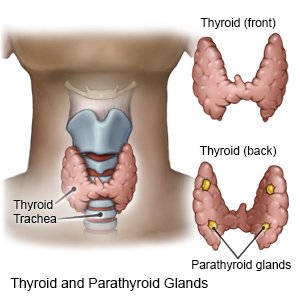Subclinical Hypothyroidism
Medically reviewed by Drugs.com. Last updated on Aug 4, 2025.
Subclinical hypothyroidism is a condition that develops when your thyroid stimulating hormone (TSH) level is higher than normal. TSH is made in the brain and controls how much thyroid hormones are made. Thyroid hormones help control body temperature, heart rate, growth, and weight. Subclinical hypothyroidism can lead to hypothyroidism.
 |
DISCHARGE INSTRUCTIONS:
Call 911 for any of the following:
- You have sudden chest pain or shortness of breath.
- You have a seizure.
- You feel like you are going to faint.
Return to the emergency department if:
- You have swelling in your legs, ankles, or feet.
- Your heart is beating faster or slower than is normal for you, or you feel restless.
Related medications
Treatment options
The following list of medications are related to or used in the treatment of this condition.
Contact your healthcare provider if:
- You have a fever.
- Your signs and symptoms return or become worse.
- You have pain, redness, and swelling in your muscles and joints.
- You have questions or concerns about your condition or care.
Medicines:
- Thyroid hormone replacement medicine may bring your thyroid hormone level back to normal.
- Take your medicine as directed. Contact your healthcare provider if you think your medicine is not helping or if you have side effects. Tell your provider if you are allergic to any medicine. Keep a list of the medicines, vitamins, and herbs you take. Include the amounts, and when and why you take them. Bring the list or the pill bottles to follow-up visits. Carry your medicine list with you in case of an emergency.
Follow up with your healthcare provider as directed:
You will need to return for more blood tests to check your thyroid hormone level. Write down your questions so you remember to ask them during your visits.
© Copyright Merative 2025 Information is for End User's use only and may not be sold, redistributed or otherwise used for commercial purposes.
The above information is an educational aid only. It is not intended as medical advice for individual conditions or treatments. Talk to your doctor, nurse or pharmacist before following any medical regimen to see if it is safe and effective for you.
Learn more about Subclinical Hypothyroidism
Treatment options
Care guides
- Acquired Hypothyroidism in Children
- Hypothyroidism
- Induced Thyroid Disorders
- Subclinical Hypothyroidism
Symptoms and treatments
Medicine.com guides (external)
Further information
Always consult your healthcare provider to ensure the information displayed on this page applies to your personal circumstances.
